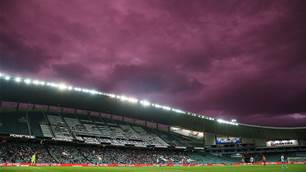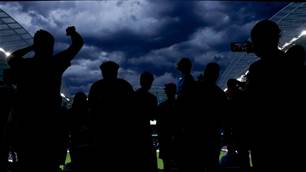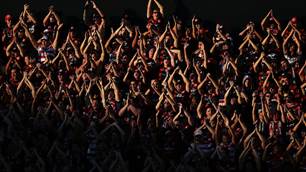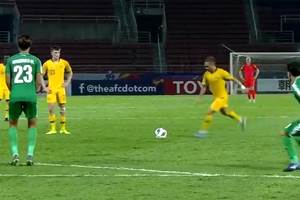The Olyroos quest to progress to the Tokyo 2020 Olympics has gotten off to a frustrating start as Graham Arnold’s men – despite a wonder strike from Reno Piscopo – held to a 1-1 draw with Iraq.
Quickly seizing control of possession early on, Australia’s first real chance of the game was delivered in the seventh minute when a forward run from captain and centre back Thomas Deng won a free-kick just outside the penalty area – Piscopo putting the subsequent set-piece just over the bar.
Though Iraq had a half-chance of their own four minutes later when Sadeq Zamil put a headed effort from a corner wide, Australia should have taken the lead in the 17th after an attempted clearance from goalkeeper Ali Kadhim was picked off and worked to Trent Buhagiar, who then played a ball across the area to Piscopo.
Cutting inside, the Wellington Phoenix attacker could only let loose with a powerful effort that streaked across the face of goal and out for a goal kick.
Said goal kick, though, was immediately sent back into the mix by Arnold’s side and eventually Connor Metcalfe won enough space to play a ball in behind the defence for Al Hassan Toure to run onto and fire home.
Alas, the goal was quickly brought back after it was determined that Toure had strayed offside in the build-up.
Frustratingly for the Olyroos, subsequent chances dried up as their foes settled into the contest, Piscopo and Aiden O’Neill only able to produce half-chances at best as the first half wore on.
Entering the second stanza, the side’s best chances were seemingly only able to be delivered via free-kicks but, luckily, Piscopo was able to produce a moment of magic just past the hour mark when he fired a walloping free-kick into the top corner to give Australia the lead.
But, jolted out of their defensive setup after going down a goal, 2013 champions Iraq roared back to life and almost went level when a free kick in from Hussein Jabbar in the 73rd minute soared just over the heads of his teammates and was cleared by a desperate Metcalfe.
Alas for Australia, four minutes later, the game was restored to equilibrium when a calamitous turnover from Deng was seized upon by Zamil and across to Mohammed Nassif.
Cutting inside, the Iraqi number nine let loose with a shot that careened off the inside of the post and into the net to make it 1-1.
Both sides had chances to win it late, Dylan Ryan heading an Alex Gersbach cross into the post and Nassif shooting an angled effort wide, but neither side had another goal in them as the spoils at the Thammasat Stadium were ultimately shared.
The Olyroos will be back in action in the wee hours of Saturday night/Sunday morning when they take on Thailand at quarter past midnight. They will then conclude their group stage fixtures against Bahrain at the same time on Tuesday evening/Wednesday morning.
Progression to Tokyo 2020 will require Arnold’s side to finish as one of the top-three finishers at the tournament.
Piscopo Shines.
Piscopo was undeniably Australia’s best player on the pitch on Wednesday evening.
Playing on the flank of the Olyroos front three, the 21-year-old demonstrated a willingness to back himself again and again against the Iraqis – who never truly finding an answer for the Wellington Phoenix playmaker.
Front and centre for almost all of Australia’s best attacks, when the former Internazionale prospect and one-time Italian youth representative wasn’t attempting to convert Australia’s chances he was involved in the build-up – winning numerous free-kicks as his opposite numbers struggled to keep up and being forced to hack him down.
Just when it appeared that Australia was in for another frustrating night at the office (more on that later), it was the A-League’s Young Player of the Year nominee for December produced an absolute thunderbolt to put a freekick from nigh-on 30-yards out into the top corner.
Naturally, he had won the set piece as well.
Substituted a few minutes later, it was a tantalising glimpse at what may be to come from the youngster for both the Olyroos and Socceroos.
He should start for the rest of the tournament.
Press Gang
One feature that couldn’t have been missed in the Olyroos warm-up fixtures against New Zealand in September had been the fierce press that the side – then under the auspices of caretaker coach Gary van Egmond – attempted to play.
On Wednesday evening, it quickly became apparent that such tactics were indeed the brainchild of Arnold, with Australia getting high up the pitch and haranguing the Iraqi defence and midfield straight from the word go.
With the broadcast operating sans commentary and there being a relatively sparse crowd in attendance, the bellows of Arnold and his staff to get up the pitch and apply pressure whenever the opportunity presented itself were obvious.
The benefits of such tactics were obvious when they worked out – Toure’s disallowed goal the most obvious example – but all or nothing desire to stream up the pitch as soon as the opportunity presented itself almost came back to bite the Olyroos on multiple occasions when Iraq was able to counter.
Ultimately, however, Australia’s inability to convert the chances that they did create in transitional moments instigated by this press meant they were forced to rely on their build-up play to produce openings...
Transition and Possession
Indeed, with the press as high fierce as it was, that Australia’s best chances were created in moments in transition and the side otherwise struggled to generate much going forward shouldn’t come as much surprise.
Such trends are now so widespread amongst Australian national teams that, at this point, it could effectively be described as the national style.
Goals change games and, without the Olyroos able to create anything from their chances on the break, the side in dark green was mostly able to sit back and maintain their defensive block when the Australians were forced to build from the back – rather than get proactive and attempt to win it back and look to reduce a deficit.
As a result, it meant that the Australians, despite winning the first-half possession battle 58% to 42% and maintaining a passing accuracy almost 20% better than their foes, mustered three fewer shots on goal and could only put one effort in that was on target.
By the time the contest concluded Australia could only add a single extra shot on target despite ending up with 60% of possession to 40% and making 419 passes compared to their foes 276.
Clear and decisive play came was at a frustrating premium, with the ability to create such moments of brilliance perhaps hampered by a selection policy that gave priority to the side’s desire to press high up the pitch.
The absence of a Denis Genreau – who entered the tournament nursing a shoulder injury – or Danny De Silva – who wasn’t selected – type in the midfield, someone that has the ability to provide incisiveness, vision and the ability to take it to an embedded defence was clear.
Both players come with their own downsides, but both are undeniably capable of helping break down opponents.
While Piscopo’s long-range bomb did look as though it would open up proceedings, the resulting press from the Iraqis exposed the problems that even the back four had when exposed to a high press: the turnover from Deng as he attempted to carry the ball out under pressure giving way to the move that ultimately led to Nassif’s equaliser in the 79th minute.
Related Articles

Robertson still committed to Socceroos: Arnold

Irankunda in strong Socceroos squad for Cup qualifiers















